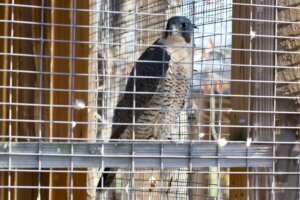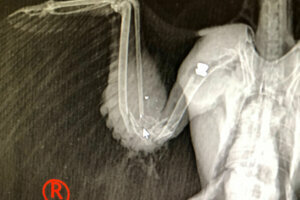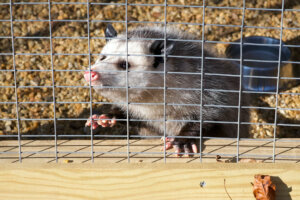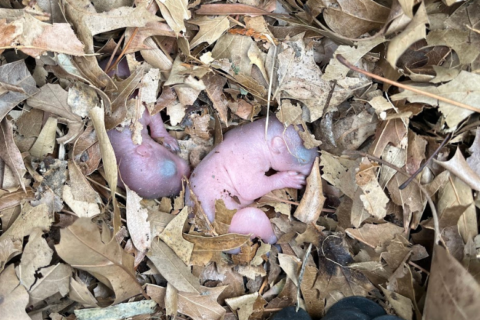
If it flies, swims, scampers or crawls, injured wildlife recovered in Northern Virginia typically ends up getting medical care at the Blue Ridge Wildlife Center in Boyce,Virginia.
Every year, more than 2,100 wild animals are brought in for care at the center’s 8,700 square foot building. Veterinarian Dr. Jennifer Riley not only administers direct medical care, performing surgeries, blood transfusions and x-rays, but also provides extended care. The goal is to be able to return the animals to the wild.
Riley works a five-day week, but said, due to the nature of the work, she’s often checking the animals on weekends. She’s not alone. Along with staff — including a licensed veterinary technician — there are dozens of specially trained volunteers.
The work is rewarding, but not glamorous, explained Riley. “There’s a lot of cleaning.”
“People are kind of excited to work with animals, but a lot of working with animals is just keeping things clean. It’s a hospital setting, we want to make sure everybody’s safe from a sanitation point of view” she said.

Volunteers and staff scrub and disinfect cages and prepare food — including mice.
Education is also a facet of the center’s mission.
Riley explained along with teaching small children about wild animals, the center hosts civic groups interested in the natural world.
“I train veterinarians, we have a licensed vet tech here. We kind of do teaching across the board for small kids, adults and people in this specialty” she said.
Riley has worked with domestic pets, but said she was driven to work with wild animals.
Now, she’s treating more exotic animals like birds of prey, including bald eagles and owls. But she said some of the most challenging patients are the smallest ones.
Last year Riley treated something called a “least weasel” — picture a ferret-like animal, bigger than a chipmunk, smaller than a squirrel. Riley said of least weasels, “They’re teeny-tiny but they’re ferocious like a fisher, or a wolverine, but the tiny version.”
Riley explained why so many wild animals end up in her care. “The top three diagnoses that we see are hit-by-cars, cat attacks and unknown trauma — usually being a hit-by-car or a cat attack that was just unconfirmed,” Riley said.
Riley said cat owners can help cut the risk to wildlife by simply keeping their pets indoors. She said just bringing up the subject can raise the hackles of cat-lovers.
“We love cats too. I think there’s a theory that wildlife people are against cats and that’s not the case,” Riley added.
She said many of the birds of prey that are hit by cars often come in with an underlying condition: lead poisoning. Bald eagles and vultures, both of which scavenge for food, often find carcasses left behind by hunters, and many of those are laced with lead shot.

Riley heads to a computer and brings up x-ray images of a turkey vulture who’d been shot. Riley and the staff were able to save the vulture, but also found something else in the big female raptor.
“The other interesting thing about her is she came in with severe lead poisoning.” Riley points out a series of tiny flecks near the bird’s crop which is part of the bird’s digestive tract. “Can you see all the little tiny fragments in there? That’s all lead too.”
Riley said the combination of the damage from the shooting and the lead poisoning meant the turkey vulture couldn’t be returned to the wild. Now the bird, named “Vega”, is an animal “ambassador.” That means she’s cared for at the center and is part of the education programming carried out at the site.
Riley called her an “awesome ambassador” because she’s very friendly and actually seems to like the company of humans.
Outside, there’s a newly built nature trail that will be open to the public in the coming year. That’s where visitors can see and learn about the other residents of the center, like “Snow” an Arctic Fox. She can’t be released because she was raised as a pet — part of the illegal pet trade — and came to the center after being seized in a criminal case.

Then there’s Nigel, the opossum who was taken in while still a baby. His siblings were able to be released, but Riley says he appeared to have some sort of developmental problems. He didn’t exhibit the same behaviors as his siblings, behaviors that would let him succeed in the wild.
“His balance was off, he wasn’t able to climb as well, he wasn’t able to manipulate food as well” as his siblings said Riley. Not only that, said Riley, instead of retreating from humans, as his siblings did, “He wanted to seek us out and hang out with people.”
A lot of visitors are thrilled to see birds like Jefferson the Bald Eagle, Briar the Red Tailed Hawk or Goose, the Peregrine Falcon. But they sometimes question the center’s dedication to less glamorous animals like opossums and vultures. Riley said those animals are vital to the ecosystem and to public health. Vultures clean the environment of animal carcasses and removing bacteria and diseases like rabies and anthrax from the food chain. Opossums feed on ticks, helping reduce the spread of tick-borne diseases, like Lyme disease and ehrlichiosis.
If you encounter a wild animal that needs help, contact your local wildlife center in Northern Virginia, Maryland or Washington, D.C. before approaching or trying to handle the animal.







